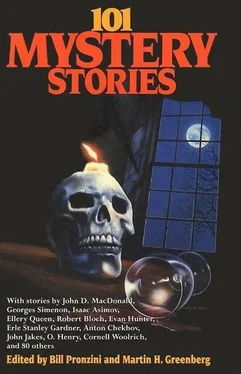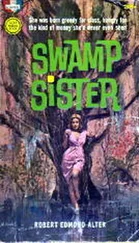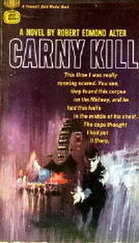Robert Alter - 101 Mystery Stories
Здесь есть возможность читать онлайн «Robert Alter - 101 Mystery Stories» весь текст электронной книги совершенно бесплатно (целиком полную версию без сокращений). В некоторых случаях можно слушать аудио, скачать через торрент в формате fb2 и присутствует краткое содержание. Город: New York, Год выпуска: 1986, ISBN: 1986, Издательство: Avenel Books, Жанр: Детектив, на английском языке. Описание произведения, (предисловие) а так же отзывы посетителей доступны на портале библиотеки ЛибКат.
- Название:101 Mystery Stories
- Автор:
- Издательство:Avenel Books
- Жанр:
- Год:1986
- Город:New York
- ISBN:978-0-517-60361-1
- Рейтинг книги:3 / 5. Голосов: 1
-
Избранное:Добавить в избранное
- Отзывы:
-
Ваша оценка:
- 60
- 1
- 2
- 3
- 4
- 5
101 Mystery Stories: краткое содержание, описание и аннотация
Предлагаем к чтению аннотацию, описание, краткое содержание или предисловие (зависит от того, что написал сам автор книги «101 Mystery Stories»). Если вы не нашли необходимую информацию о книге — напишите в комментариях, мы постараемся отыскать её.
101 Mystery Stories — читать онлайн бесплатно полную книгу (весь текст) целиком
Ниже представлен текст книги, разбитый по страницам. Система сохранения места последней прочитанной страницы, позволяет с удобством читать онлайн бесплатно книгу «101 Mystery Stories», без необходимости каждый раз заново искать на чём Вы остановились. Поставьте закладку, и сможете в любой момент перейти на страницу, на которой закончили чтение.
Интервал:
Закладка:
He looked back, thinking over the good times. The time before they’d come to the island, when he’d been hard-working at the glass-cutting business he’d inherited from his father. Then more and more he’d become conscious of Helen’s beauty and the effect she had on men. And loving her as wildly as he did, he could no longer bear the endless suspense; the knowledge that sooner or later, she would leave him. So he sold the business, retired. His little lie. So far as she knew, he simply wanted island life — quite, unhurried, alone with her. It was true. But not a complete truth.
All this time they had been happy. Until now. Somebody’d got wind of the beauty of the island and Latimer had shown up, to do his story. Under conditions imposed by Nolan — no pictures of either himself or Helen. He had allowed one fuzzy negative of them standing against a blossoming hibiscus near the house, at twilight — that was all.
Wandering through the house, trying not to think of what they were doing now, he found himself in Latimer’s room. The unmade bed, the photographic equipment, the typewriter set up on the table.
Beside the machine was a typewritten letter.
Nolan turned away. But something drew him over to the table. Pure curiosity in this man Latimer. He stood there, staring down at the obviously unfinished letter. An addressed envelope lay beside it. There was a half-completed sentence on the sheet in the typewriter, numbered Page Two.
The letter was addressed to the editor of the magazine where Latimer worked.
Nolan began reading, at first leisurely, then feverishly.
“Dear Bart:
Really have this thing wrapped up, but I’m staying on a while longer, just to settle a few things in my own mind and maybe I’ll come up with a bunch of pix and a yam that’ll knock your head off... sure beautiful scenery on the island... house is a regular bamboo and cypress mansion... unhealthy, Bart, really sick... he watches her like a hawk. He’s ripped with jealousy and it would be laughable, except that they’re both so very old. He must be in his eighties, but she’s a bit harder to read. I did a lousy thing. I confronted her with it. You would have, too. She’s so obviously just enduring everything for his sake. Humoring him. My God, think of it! All these years he’s kept her out here, away from everybody, imprisoned. It’s pure hell. She as much as admitted it.
I’m staying on, just to see if I can’t work it somehow. Get her back to civilization, if only for a vacation, Bart. She deserves it. You should hear her ask how things are out there — it would break your damned heart...”
There was more and Nolan read all of it through twice. For a moment longer, he stood there, seeing everything clearly for the first time in nearly a half century.
Then he walked through the house to his study, opened the desk drawer, took out the .45 automatic. He sat down in his chair by the desk, put the muzzle of the gun into his mouth and pulled the trigger.
9
The Little House at Croix-Rousse
Georges Simenon
I had never see Joseph Leborgne at work before. I received something of a shock when I entered his room that day.
His blond hair, usually plastered down, was in complete disorder. The individual hairs, stiffened by brilliantine, stuck out all over his head. His face was pale and worn. Nervous twitches distorted his features.
He threw a grudging glare at me which almost drove me from the room. But since I would see that he was hunched over a diagram, my curiosity was stronger than my sensitivity. I advanced into the room and took off my hat and coat.
“A fine time you’ve picked!” he grumbled.
This was hardly encouraging. I stammered, “A tricky case?”
“That’s putting it mildly. Look at that paper.”
“It’s the plan of a house? A small house?”
“The subtlety of your mind! A child of four could guess that. You know the Croix-Rousse district in Lyons?”
“I’ve passed through there.”
“Good! This little house lies in one of the most deserted sections of the district — not a district, I might add, which is distinguished by its liveliness.”
“What do these black crosses mean, in the garden and on the street?”
“Policemen.”
“Good Lord! And the crosses mark where they’ve been killed?”
“Who said anything about dead policemen? The crosses indicate policemen who were on duty at these several spots on the night of the eighth-to-ninth. The cross that’s heavier than the others is Corporal Manchard.”
I dared not utter a word or move a muscle. I felt it wisest not to interrupt Leborgne, who was favoring the plan with the same furious glares which he had bestowed upon me.
“Well? Aren’t you going to ask me why policemen were stationed there — six of them, no less — on the night of the eighth-to-ninth? Or maybe you’re going to pretend, that you’ve figured it out?”
I said nothing.
“They were there because the Lyons police had received, the day before, the following letter:
“Dr. Luigi Ceccioni will be murdered, at his home, on the night of the eighth-to-ninth instant .”
“And the doctor had been warned?” I asked at last.
“No! Since Ceccioni was an Italian exile and it seemed more than likely that the affair had political aspects, the police preferred to take their precautions without warning the party involved.”
“And he was murdered anyway?”
“Patience! Dr. Ceccioni, fifty years of age, lived alone in this wretched little hovel. He kept house for himself and ate his evening meal every day in an Italian restaurant nearby. On the eighth he left home at seven o’clock, as usual, for the restaurant. And Corporal Manchard, one of the best police officers in France and a pupil, to boot, of the great Lyons criminologist Dr. Eugene Locard, searched the house from basement to attic. He proved to himself that no one was hidden there and that it was impossible to get in by any other means than the ordinary doors and windows visible from the outside. No subterranean passages nor any such hocus-pocus. Nothing out of a mystery novel... You understand?”
I was careful to say nothing, but Leborgne’s vindictive tone seemed to accuse me of willfully interpolating hocus-pocus.
“No one in the house! Nothing to watch but two doors and three windows! A lesser man than Corporal Manchard would have been content to set up the watch with only himself and one policeman. But Manchard requisitioned five, one for each entrance, with himself to watch the watchers. At nine P.M. the shadow of the doctor appeared in the street. He re-entered his house, absolutely alone. His room was upstairs; a light went on in there promptly. And then the police vigil began. Not one of them dozed! Not one of them deserted his post! Not one of them lost sight of the precise point which he had been delegated to watch!
“Every fifteen minutes Manchard made the round of the group. Around three A.M. the petroleum lamp upstairs went out slowly, as though it had run out of fuel. The corporal hesitated. At last he decided to use his lock-picking gadget and go in. Upstairs, in the bedroom, seated — or rather half lying — on the edge of the bed was Dr. Luigi Ceccioni. His hands were clutched to his chest and he was dead. He was completely dressed, even to the cape which still hung over his shoulders. His hat had fallen to the floor. His underclothing and suit were saturated with blood and his hands were soaked in it. One bullet from a six-millimeter Browning had penetrated less than a centimeter above his heart.”
I gazed at Joseph Leborgne with awe. I saw his lip tremble.
“No one had entered the house! No one had left!” he groaned. “I’ll swear to that as though I’d stood guard myself: I know my Corporal Manchard. And don’t go thinking that they found the revolver in the house. There wasn’t any revolver! Not in sight and not hidden. Not in the fireplace, or even in the roof gutter. Not in the garden — not anywhere at all! In other words, a bullet was fired in a place where there was no one save the victim himself and where there was no firearm!
Читать дальшеИнтервал:
Закладка:
Похожие книги на «101 Mystery Stories»
Представляем Вашему вниманию похожие книги на «101 Mystery Stories» списком для выбора. Мы отобрали схожую по названию и смыслу литературу в надежде предоставить читателям больше вариантов отыскать новые, интересные, ещё непрочитанные произведения.
Обсуждение, отзывы о книге «101 Mystery Stories» и просто собственные мнения читателей. Оставьте ваши комментарии, напишите, что Вы думаете о произведении, его смысле или главных героях. Укажите что конкретно понравилось, а что нет, и почему Вы так считаете.












